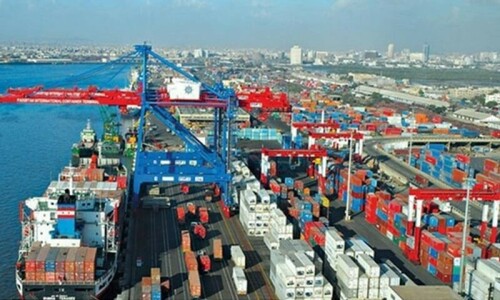ISLAMABAD: The country’s political and military leadership explained Islamabad’s stance on the turmoil in Yemen to Iran’s foreign minister on Thursday, making it clear that “the people of Pakistan hold Saudi Arabia in high esteem and will stand shoulder to shoulder” with the latter if its territorial integrity was violated.
Javad Zarif, the Iranian Foreign Minister, called on Prime Minister Nawaz Sharif and Army Chief Gen Raheel Sharif to seek their support for Tehran’s four-point formula for resolution of the crisis that begins with a proposal for ceasefire. Other proposals call for intra-Yemeni dialogue, formation of a broad-based government and provision of humanitarian assistance. But Mr Zarif was unable to win Islamabad’s backing for the formula, reliable sources told Dawn.
A statement issued by the Prime Minister’s Office (PMO) quoted Nawaz Sharif as having said: “It is the shared responsibility of all states to refrain from actions that disturb peace and stability in any country.”
Mr Sharif expressed his government’s concern over actions of the Houthi militia, which captured the Yemeni capital last month, forcing President Mansur Hadi to take refuge first in Aden and then leaving the country for Saudi Arabia.
Javad Zarif visits GHQ
The government shared the Arab view that Iran was expanding its influence in the Middle East to the detriment of Saudi Arabia and its allies, Mr Zarif was told.
Prime Minister Nawaz Sharif, taking part in the parliamentary debate on the Yemen issue earlier this week, had said: “Iran needs to think over its policy and see if it is doing the right thing.”
Emphasising the seriousness of the situation in Yemen, the prime minister said it was so critical that it could endanger other Muslim countries, besides undermining the unity of the Muslim world.
The PMO statement said the prime minister also discussed bilateral matters with Javad Zarif, but nothing was shared with media.
The issue of cross-border terrorism from alleged sanctuaries in Balochistan in Iran’s Sistan-Baluchestan province resurfaced with the killing of eight Iranian border guards on Monday.
Mr Sharif, nevertheless, hoped that Pakistan and Iran could have “friendly and cooperative ties”.
GHQ: A military spokesman, in a statement on Mr Zarif’s visit to GHQ where he met Army Chief Gen Raheel Sharif, said: “Focus of the discussion remained on regional security, including evolving situation in the Middle East, Pak-Iran border management and defence and security cooperation between both the countries.”
Mr Zarif, paying a rare visit to the military headquarters by an Iranian dignitary, was presented a guard of honour upon his arrival.
Iran has had a cold relationship with Pakistan’s armed forces. However, a military source suggested that things were now changing and both sides were warming to each other.
The source said the two sides would exchange visits by high-level delegations in coming weeks.
On the Yemen issue, the spokesman said, there was an agreement on finding a peaceful solution.
“During the meeting, the unity and integrity of Muslim Ummah and greater harmony amongst Muslims was emphasised,” the military spokesman added.
The Iranian foreign minister appreciated achievements of Operation Zarb-i-Azb and acknowledged Pakistan’s sacrifices for bringing peace and stability to the region.
He laid a floral wreath at Yadgar-i-Shuhada and offered Fateha.
SENATE & NATIONAL ASSEMBLY: Senate Chairman Raza Rabbani, in his meeting with Mr Zarif, said Pakistan’s likely role in Yemen conflict was being debated by parliament and the government “will go by the decision of the parliament”.
National Assembly Speaker Ayaz Sadiq laid stress on a negotiated settlement of the conflict.
Published in Dawn, April 10th, 2015
On a mobile phone? Get the Dawn Mobile App: Apple Store | Google Play











































